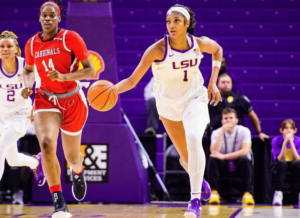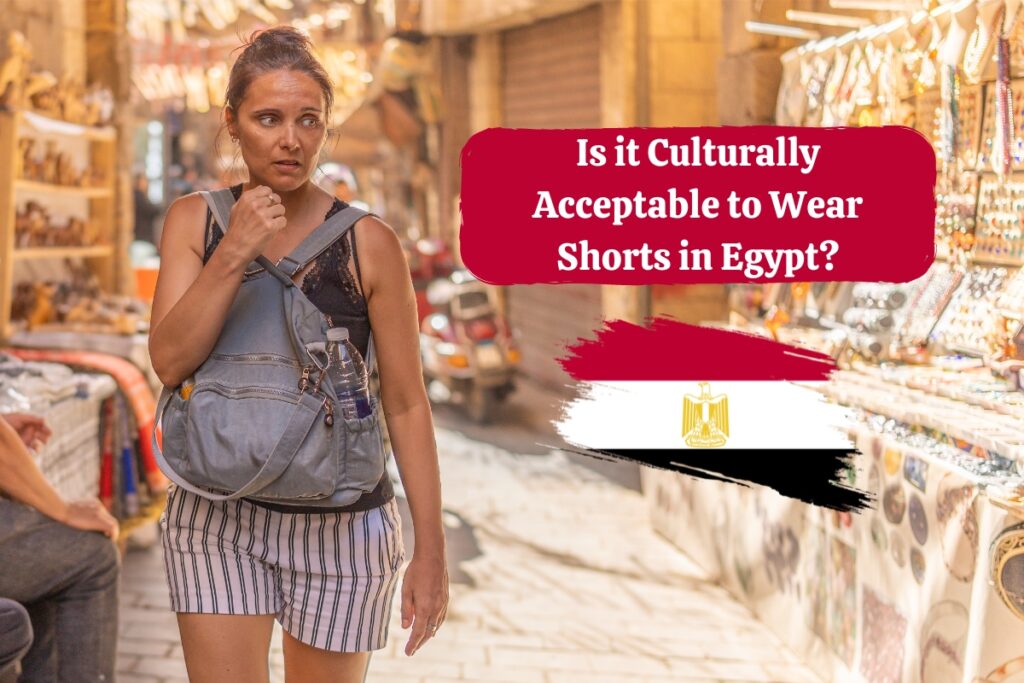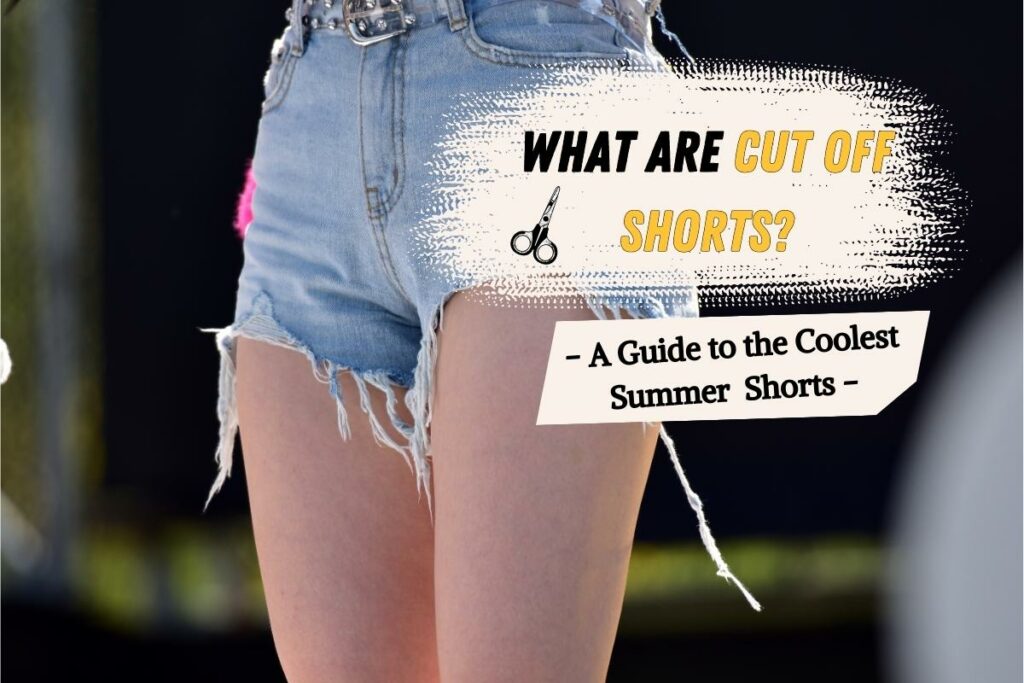Can You Wear Shorts in Egypt? What You Need to Know to Avoid Offending Locals
Visiting Egypt can be an impressive experience, marked by the country’s ancient civilizations, rich history, beautiful landscapes and old monuments. The country nestled on the northeastern tip of Africa, offers a unique cultural experience for any visitor who is eager to discover the country’s wonders from pyramids and ancient temples to bustling bazaars
Yet, one nagging question that frequently arises among passengers planning their Egyptian adventure revolves around the dress code. More specifically, the question is “Can You Wear Shorts in Egypt?” The answer isn’t a simple yes or no as it is intertwined with elements of religious customs and beliefs as well as specific contexts.
We will take an in-depth look into this topic, giving you a comprehensive insight into Egypt’s cultural norms and practical tips for dressing in such a country
An Overview of Egypt’s Culture and Dress Code ⚱️🐫🏺🐪🛕
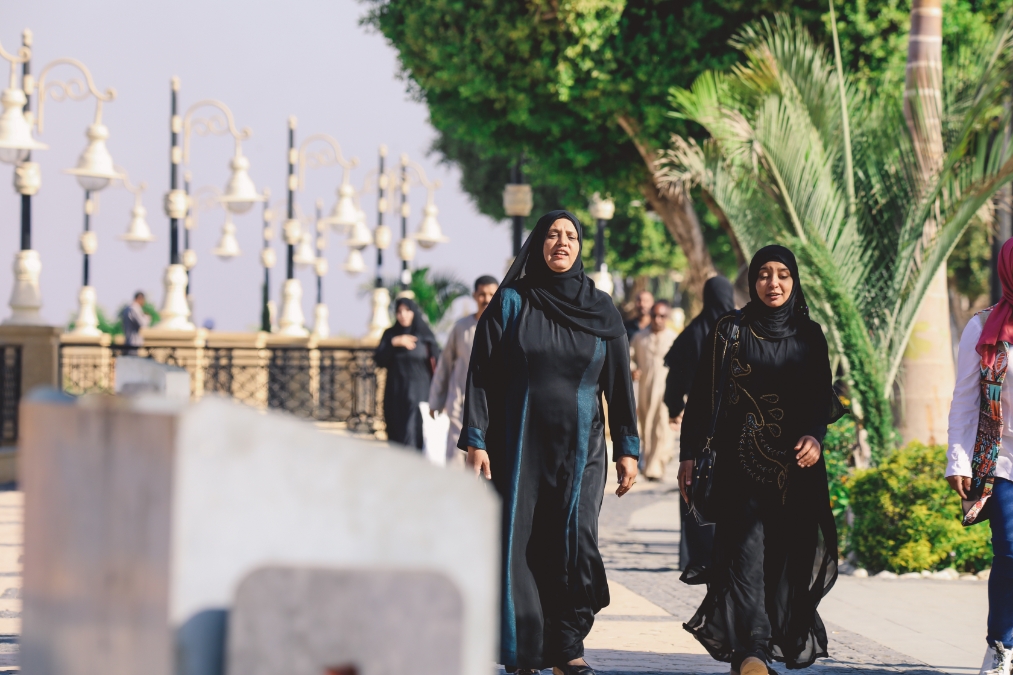
Egypt’s population is predominantly Muslim, with Islam being the state religion. As such, the cultural practices, including the dress code, are deeply intertwined with elements of religious customs and beliefs.
This is particularly noticeable in the more traditional and rural areas, where women typically wear djellabas (traditional loose-fitting robes) or Kaftans, while covering their heads and on the other hand, men wear traditional tunics (loose-fitting cloaks extending to the hips or knees) over trousers.
However, tourists are not expected to strictly adhere to these traditional attires as locals It’s essential to be respectful and mindful of local customs and traditions
Dressing modestly in particularly rural or religious areas, is a form of courtesy and respect to the local culture and decorum
Can You Wear Shorts In Egypt?
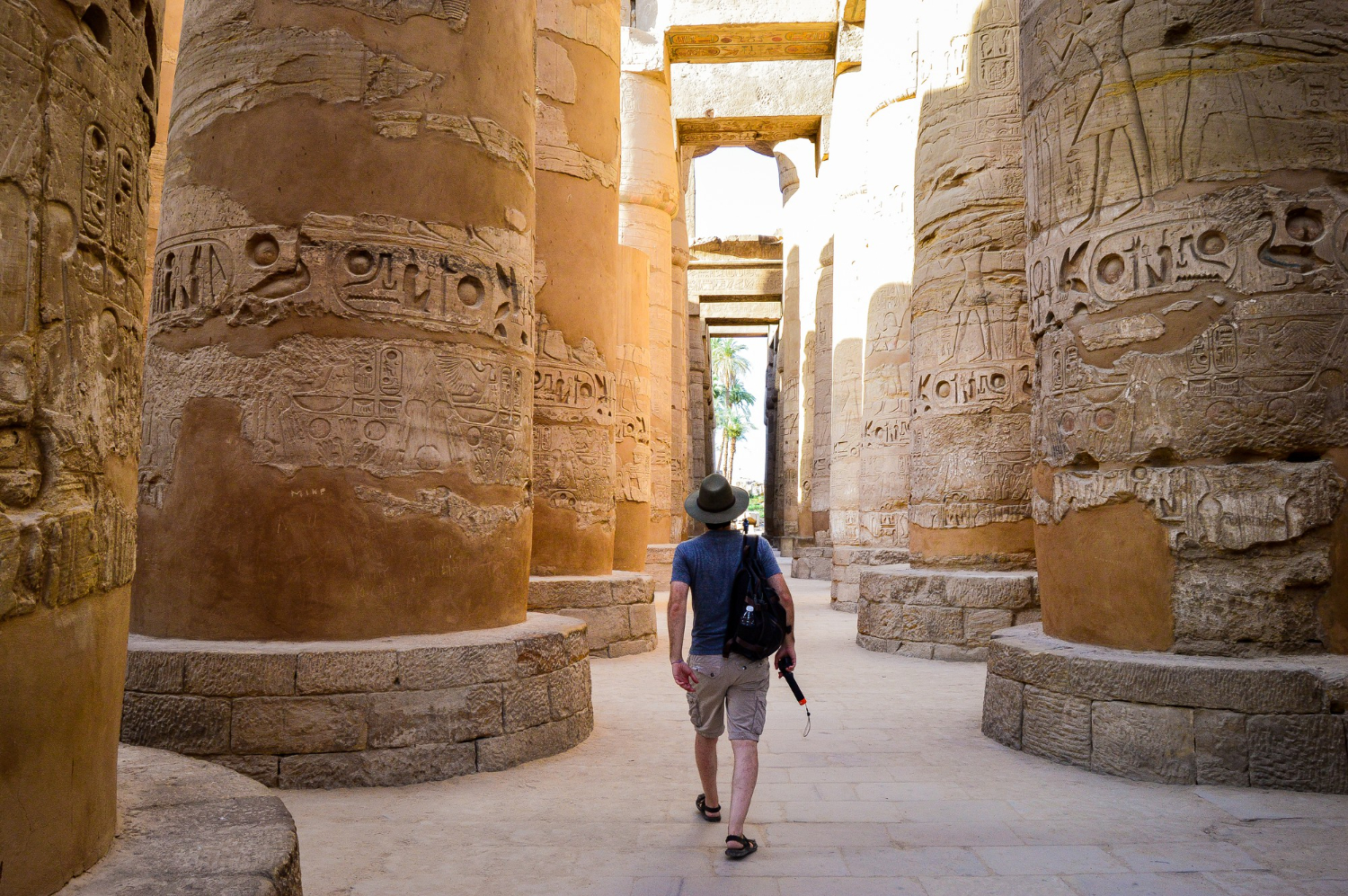
Yes, you can but it depends on specific contexts and the situation in which you plan to wear them.
In touristic areas like Sharm EL Sheikh, Hurghada, El Gouna and parts of Cairo, the dress code is more relaxed and wearing shorts is more accepted.
However, non-touristy areas, religious sites and rural parts of Egypt are characterized by a conservative dress code and it’s recommended to dress more modestly to respect the local customs
You May Also Like:
Understanding The Significance of Dressing Modestly In Egypt
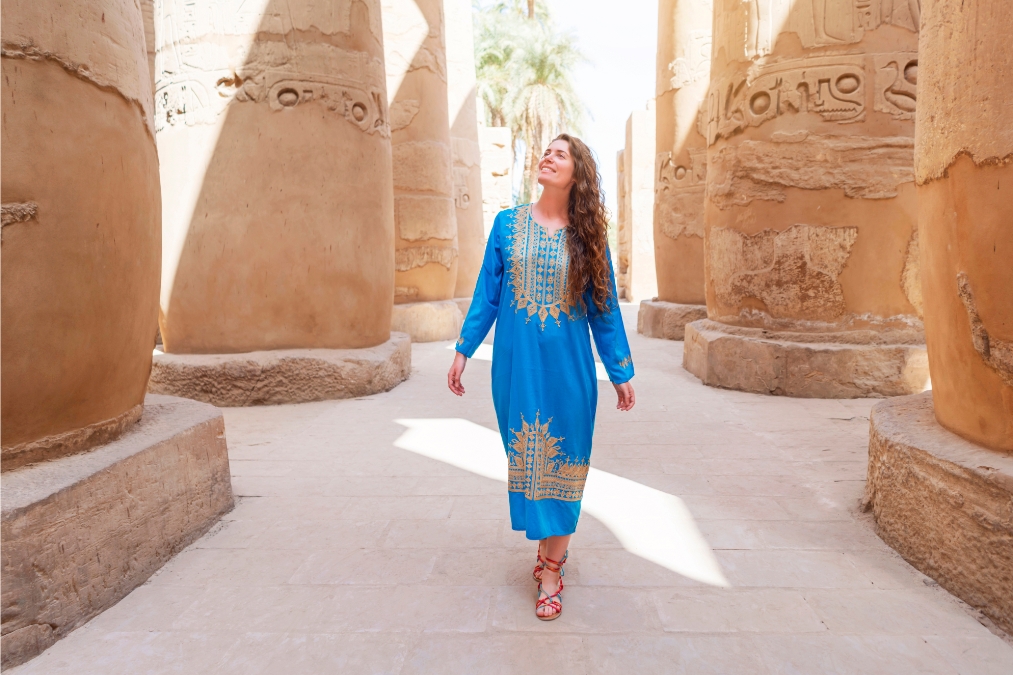
Modesty is a significant aspect of the Islamic faith and it directly impacts the dress code in Egypt.
For Women, this typically means covering the shoulders, arms and legs.
While for Men, this means covering the body from the navel to the knee
However, this doesn’t mean that all foreigners should adhere to these rules as they are for locals and tolerance is often given due to cultural differences
In touristic areas, locals are used to seeing tourists and are more lenient towards Western-style outfits.
Wearing shorts in these places are more acceptable. However, this can not be the norm in rural or religious places, where modest dress is not only a sign of respect but often a requirement wearing shorts in these areas may draw unnecessary attention and could be seen as a sign of disregard to their local customs.
What to Wear In Egypt for A Comfortable and Respectful Journey
The type of activities you’re planning for your Egyptian adventure, the climate considerations, the need to respect the local culture and norms are major factors that may influence your choice of attire. Here are some general guidelines to help you when you decide to pack for your trip to Egypt.
-
1#- Lightweight, Loose Clothing
Egypt’s climate can be swelteringly hot especially in the summer months when temperatures can skyrocket. Opt for clothing made from lightweight breathable materials like cotton or linen to keep cool. These materials also tend to be less clingy, which fits in well with the preference for loose clothing
Loose clothing is indeed comfortable in the heat and aligns with the preference for modest dress.
-
2#- Long Pants and Skirts
Swap your shorts for long pants or skirts. They are more culturally appropriate, particularly outside tourist areas and also provide protection from the sun.
-
3#- T-Shirts and Long-Sleeve Tops
When visiting religious sites like mosques, modesty is absolutely non-negotiable, it’s a good idea to pack some long-sleeve tops.
-
4#- Headscarf
In religious places, women should cover their heads, shoulders and knees. So they may need to pack a headscarf.
-
5#- Sensible Footwear
Given the uneven terrain and vastness of sites like the Pyramids comfortable walking shoes are a must sandals are also practical for the beach or relaxing days.
-
6#- Swimwear
Swimwear is only acceptable when you are at the beach, pools or on boats but it can draw unwanted attention when you are in public, it’s best to cover up when you’re not in the water.
-
7#- Sun Protection
The Egyptian sun can be intense, so packing sun protection items like wide-brimmed hats, sunglasses, and sunscreen is essential to shield yourself from harmful UV rays.
-
8#- Hand Sanitizer and Wet Wipes
Staying clean and fresh is important. Having hand sanitizer and wet wipes on hand can be especially useful during your travels.
-
9#- Backpack or Tote Bag
Carry a lightweight backpack or tote bag to carry your essentials like water, snacks, sunscreen, and a camera while exploring. This leaves your hands free and helps distribute the weight evenly.
-
10#- Lightweight Rain Gear
If you’re traveling during Egypt’s brief rainy season (usually between November and March), consider packing a compact, lightweight rain jacket or umbrella.
What Not To Wear In Egypt: Guidelines For The Mindful Traveler
Egypt is a popular travel destination known for its fascinating history, iconic landmarks and warm hospitality. As with any Islamic country, it is characterized by a conservative dress code and this is particularly noticeable in the more traditional religious as well as rural areas
Understanding what not to wear in Egypt can enhance your travel experience, fostering respect and mutual understanding and exchange with the locals.
-
1#- Revealing Clothing
While Egypt is considered one of the most liberal Islamic countries, maintaining respect for local customs and traditions is crucial It’s worth to note that revealing clothes are not generally the norm especially outside of resorts and touristic areas.
Women should avoid too tight, sheer or very short clothes that may show a lot of skin. However Long Pants, Skirts Knee-Length or Longer Shorts are generally accepted. On the other hand, Men are advised not to go shirtless in public or wearing very short shorts.
However, short-sleeved shirts and t-shirts are generally accepted.
-
2#- Inappropriate Attire for Religious Sites
When visiting places of worship like mosques, modesty is absolutely a requirement.
Shorts are generally seen as inappropriate attire for both genders in this context
Women are typically required to cover their hair, arms and legs and men should wear long pants and shirts with sleeves
Inappropriate attire for visiting such places would include shorts, sleeveless tops and for women, any clothing that does not cover the hair.
If you plan on visiting this architectural marvel (mosque), remember to dress modestly out of respect for the place of worship.
-
3#- Beachwear Outside The Beach
Swimwear is acceptable at the beach, pools or on boats and it is inappropriate to wear in town or in public while shopping or visiting attractions. Walking around in a bikini top or a swimwear is considered immoral and disrespectful.
-
4#- Clothing Disrespectful of Local Culture
Any clothing that carries offensive slogans or images particularly those that could be seen as humiliation for Muslims or as disrespectful of Islam or local customs should be avoided It’s generally best to avoid wearing prominent religious symbols to respect the Islamic majority’s beliefs.
-
5#- Uncomfortable Shoes:
Selecting the right footwear can make a substantial difference in your travel experience. Opt for closed-toe shoes or sturdy sandals that provide proper support and comfort. Egypt’s historical sites and bustling streets often involve a significant amount of walking, so prioritizing your foot comfort is essential. Steer clear of new or uncomfortable shoes that may lead to blisters or discomfort.
-
6#- Excessive Jewelry:
Flashy or excessive jewelry might attract unwanted attention and potentially make you a target for theft:
- Minimalist Approach: Opt for a minimalist jewelry style that complements your outfit without drawing excessive attention. A simple necklace, stud earrings, or a watch can enhance your look without being overly conspicuous.
- Avoid Flashy Pieces: Flashy, oversized, or valuable-looking jewelry might attract the wrong kind of attention and increase the risk of theft.
- Secure Storage: Consider leaving expensive or sentimental pieces at home and travel with only what you need. Utilize hotel safes or secure pockets to store your valuables while exploring.
- Be Mindful at Markets: When shopping in local markets, be cautious about trying on jewelry or revealing valuables, as this could attract unwanted attention from potential pickpockets.
-
7#- Heavy, Dark Clothing
Egypt summers are very hot and heavy, dark clothing will absorb the heat, making you uncomfortable. Instead, lightweight, breathable clothing may help protect your skin from the sun.
Dressing Respectfully During Religious Periods
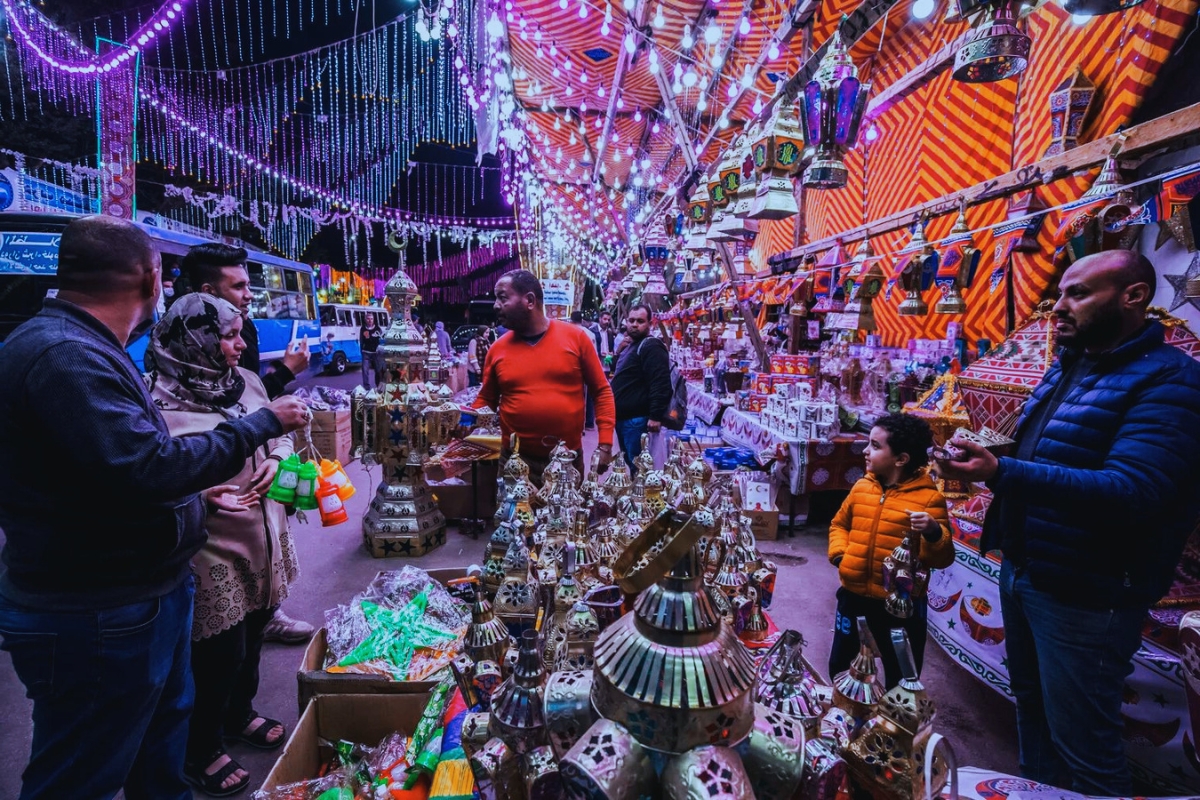
The holy month of Ramadhan is a special event that all Muslims all over the world celebrate, including Egypt as being predominantly an Islamic country
During this time from every year, Muslims fast from dawn to sunset, engage in prayer and practice acts of charity.
Tourists are expected to show an elevated level of respect, particularly in their clothing choices.
So during the holy month of Ramadhan avoid wearing shorts and opt for more conservative clothing.
Practical Tips For Dressing In Egypt
Beyond the general guidelines, there are a few handy tips and tricks that can make your Egyptian journey more comfortable
- Look at What Locals are Wearing
One of the best ways to understand what is appropriate in terms of dress code is to look at what locals are wearing
In Egypt, You’ll find that men often wear tunics over pants while women wear loose, flowing clothes that cover most of their bodies like djellabas (traditional loose-fitting robes)
- Ask
If in doubt, ask.
Most tour guides or local friends will be more than happy to give advice. They know in advance that tourists coming from different countries may be confused of dress codes in Egypt and may ignore specific guidelines regarding local customs and norms.
Conclusion:
To answer the initial question “Can you wear shorts in Egypt”, Yes but it depends.
While Egypt’s dress code might seem a bit conservative, it allows tourists to wear shorts in tourist areas and locals seem to be more lenient and tolerant towards them.
Egypt is one of the most liberal countries and it welcomes visitors each year from all walks of life, offering a unique blend of tradition and culture By dressing appropriately, you can fully enjoy the country’s charm from its ancient pyramids to its luxurious bazaars, while showing respect for its local customs.
Remember, the goal is to find a balance between comfort and modesty, understanding what to wear and not to wear in Egypt help you to embrace all the experiences Egypt has to offer with peace of mind
So pack those shorts for your trip to Egypt but also include a variety of clothes to suit all possible scenarios keep these tips in mind and you’ll be ready to explore Egpt with confidence and style.
Enjoy The Journey and Welcome to Egypt!!
Frequently Asked Questions (FAQs) About What to Wear in Egypt
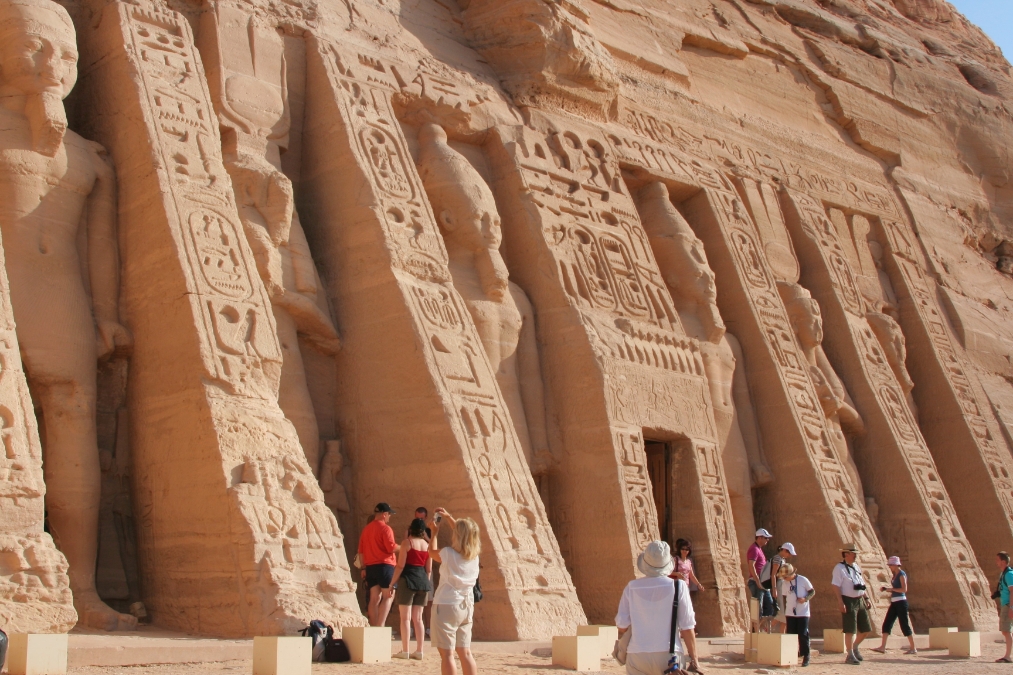
Now that we’ve covered the specifics, let’s tackle some commonly asked questions related to the dress code in Egypt.
-
Q1: What Are The Cultural Norms Around Dress In Egypt?
A: Egypt is a conservative country, and dress is an important part of Egyptian culture. Women are generally expected to cover their shoulders, knees, and chest when in public. Men are also expected to dress modestly, and should avoid wearing shorts or tank tops in public.
-
Q2: What Are The Consequences Of Wearing Shorts In Egypt?
A: If you are a female tourist who wears shorts in Egypt, you may be stared at, harassed, or even arrested. It is important to be aware of the cultural norms around dress in Egypt and to dress accordingly to avoid any problems.
-
Q3: Is It Compulsory For Female Tourists To Wear A Headscarf In Egypt?
A: No, it’s not compulsory for female tourists to wear a headscarf in Egypt. However, it’s appreciated if you cover your hair when visiting religious sites like mosques.
-
Q4: What About Children? Can They Wear Shorts Freely?
A: Children can wear shorts in most places without any issues. However, it’s a good idea to still dress them modestly when visiting religious or traditional sites.
-
Q5: Can You Wear White In Egypt?
A: Yes, you can wear white clothing in Egypt. White is a popular color choice for clothing, especially in warm and sunny climates like Egypt’s. It reflects sunlight and helps keep you cool.
-
Q6: Can You Wear Shorts in Egypt in September?
A: Yes, you can generally wear shorts in Egypt in September. During this time, the weather is typically warm and comfortable, making shorts a suitable choice for staying cool.
-
Q7: Can I Wear Sleeveless Tops Or Dresses In Egypt?
A: In more conservative areas and religious sites, sleeveless tops or dresses might attract unwanted attention. But in larger cities, at tourist sites, and in resorts, it’s generally fine. A handy tip for women would be to carry a shawl or scarf to cover up when necessary.
-
Q8: What to Wear to The Pyramids in Egypt
A: When visiting the pyramids in Egypt, it’s important to choose clothing that is both respectful of the cultural context and suitable for the weather and terrain. Here’s a recommended attire:
- Modest and Comfortable Clothing: Opt for lightweight and breathable clothing that covers your shoulders and knees. Loose-fitting pants, capris, or a knee-length skirt are good options.
- Long-sleeved Shirt or Blouse: Wear a comfortable long-sleeved shirt or blouse to provide additional coverage and protect your skin from the sun.
- Sun Protection: Egypt can be hot, so wearing a wide-brimmed hat, sunglasses, and applying sunscreen is essential to protect yourself from the sun’s rays.
- Sturdy Footwear: Choose closed-toe shoes or comfortable sandals with good grip, as you’ll likely be walking on uneven terrain around the pyramids.
- Scarves or Shawls: Carry a lightweight scarf or shawl in your bag. You can use it to cover your shoulders or head when entering religious sites or if you want extra sun protection.
- Layers: If you’re visiting during cooler months, consider bringing a light sweater or jacket for the early morning or evening temperatures.
- Modest Swimwear (Optional): If your itinerary includes a visit to a nearby pool or resort, you can wear a modest swimsuit. However, remember to wear a cover-up when you’re not in the water.
- Backpack or Tote Bag: A small backpack or tote bag can carry your essentials, including water, sunscreen, a camera, and your scarf or shawl.
- Cultural Sensitivity: Remember that the pyramids hold historical and cultural significance. Dressing respectfully shows consideration for the local culture and enhances your experience.
- Check Site-Specific Guidelines: Different archaeological sites may have specific dress code requirements, so it’s a good idea to check ahead of time.
By choosing appropriate clothing, you’ll ensure a comfortable and respectful experience while exploring the iconic pyramids of Egypt.
-
Q9: What Are The Benefits Of Dressing Conservatively In Egypt?
A: There are a few benefits to dressing conservatively in Egypt. These include:
- Avoiding unwanted attention
- Respecting local customs
- Feeling more comfortable in hot weather
- Fitting in with the local culture
-
Q10: What Are Some Places Where It Is Not Appropriate To Wear Shorts In Egypt?
A: There are a few places in Egypt where it is not appropriate to wear shorts. These include:
- Mosques
- Government buildings
- Religious sites
- Traditional villages
- Rural areas

